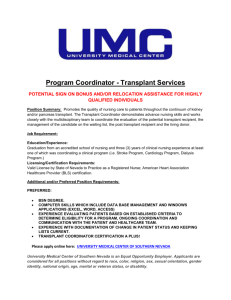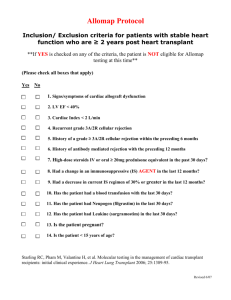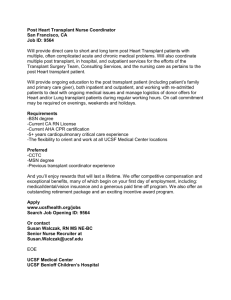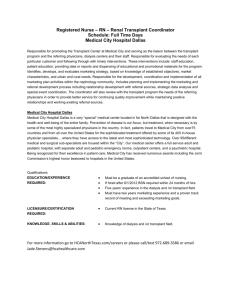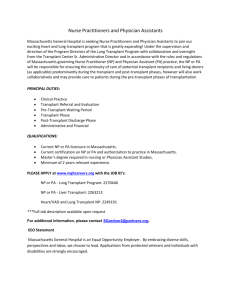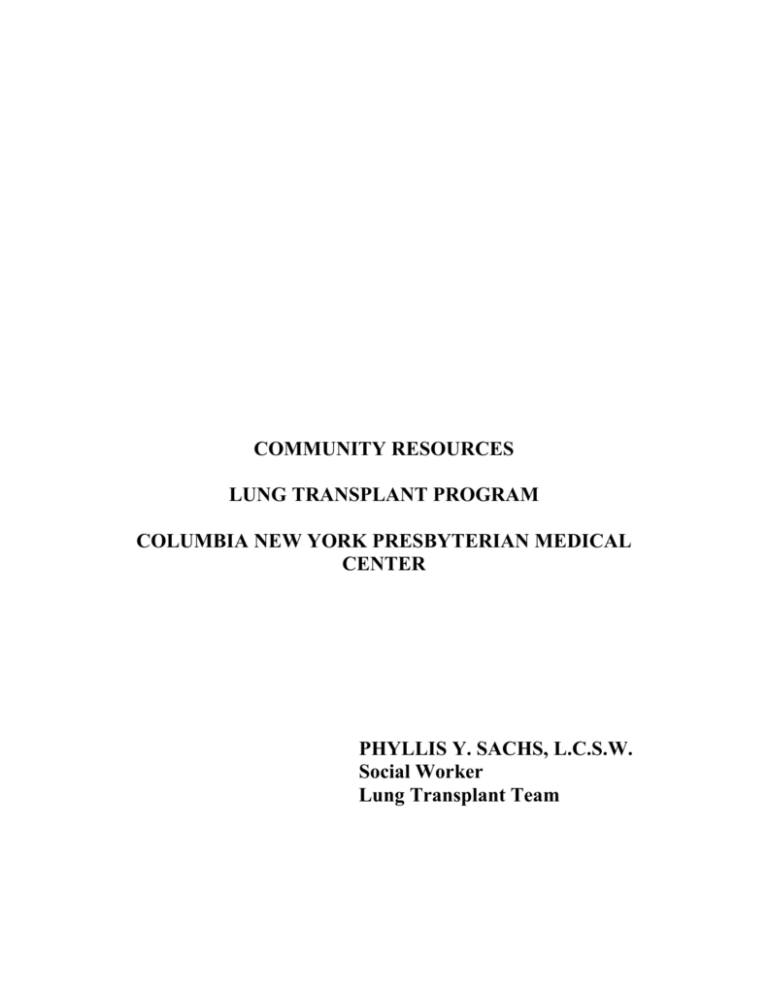
COMMUNITY RESOURCES
LUNG TRANSPLANT PROGRAM
COLUMBIA NEW YORK PRESBYTERIAN MEDICAL
CENTER
PHYLLIS Y. SACHS, L.C.S.W.
Social Worker
Lung Transplant Team
2
TABLE OF CONTENTS
Welcome and Purpose of this Booklet………………………… Page 3
Confidentiality………………………………………………….. Page 4
Advanced Directives…………………………………………….Pages 5-6
Parking…………………………………………………………. Pages 7-8
New York Presbyterian Lung Transplant Support
Group…………………………………………………..............
Page 9
Outside Support Groups/Informational
Websites………………………………………………………….Pages 10-12
Fund Raising……………………………………………………..Page 13
Transportation……………………………………………………Pages 14-15
Overnight Accommodations…………………………………… Pages 16-17
Pharmacy…………………………………………………………Page 18
Medicare Part D………………………………………………….Pages 19-20
Prescription Assistance Programs………………………………..Page 21
Home Care……………………………………………………….Pages 22-23
Outpatient Pulmonary Rehabilitation…………………………….Page 24
3
WELCOME AND PURPOSE OF THIS BOOKLET
Welcome to the Lung Transplant Program at Columbia Presbyterian Medical
Center.
Columbia is a big place (almost like a little city unto itself) and lung
transplant is a major commitment. The purpose of this booklet is to provide
you with information that will hopefully enable you to navigate though the
various stages of lung transplant. Many of you have contributed
information, and for that I thank you!
If you have some information that is not in this manual, please let me know
so that it can be added and then others can benefit. I hope to make this a
work in progress.
If at any time you require further assistance, please feel free to call me. I
can be reached at 212-305-6266. My e-mail is phs9009@nyp.org.
I wish you the best of luck. Transplant has its ups and downs. Hopefully,
together, we can work to make your experience at Columbia and with
transplant as seamless as possible.
Phyllis Sachs, L.C.S.W.
4
CONFIDENTIALITY
POLICY: It is the policy of New York Presbyterian Hospital to be committed to
providing privacy for patients in the hospital, as well as confidentiality of
all records and information regarding their care. This is consistent with
New York State Department of Health regulation, OMH regulations,
JCAHO Standards and HIPPA regulations.
PURPOSE: To set forth the means by which this policy is implemented through the
medical center.
APPLICABILITY:
All employees are educated on a regular basis with regard to the
importance of maintaining both privacy and confidentiality and are
mandated to do so for all patients.
PROCEDURE:
In-service education addresses in detail the Hospital’s standards regarding privacy and
confidentiality, which includes HIV related information. Employees are required to sign a
confidentiality statement at the time of hire, and annually thereafter. All hospital staff is
reminded not to discuss patient information in public areas such as elevators and to knock
on doors before entering patient rooms.
Hospital policy also requires that confidentiality of medical records be respected, and that
disclosure of medical information be made only to the patient or appropriately authorized
individuals. Electronic medical records require appropriate safeguards to ensure patient
record confidentiality.
Questions regarding patient privacy or confidentiality, including who is authorized to
receive patient information should be addressed to Patient Services/Relations or the
Hospital’s Privacy Officer. Disclosure of HIV-related information is addressed in the
Hospital’s HIV Testing and Confidentiality Policy and annual education.
RESPONSIBILITY:
Patient’s Rights and Organizational Ethics Policy Review Committee
Corporate Compliance Privacy Office
REVIEWED/ REVISED: September 2005
1
NewYork Presbyterian Hospital Site: Behavioral Health Service Line Hospital Policy
and Procedure Manual Number: Page 1 of 1
1
ADVANCED DIRECTIVES
It is important to keep in mind that advanced directives are for your benefit.
Everyone is an individual, with their own set of beliefs, ethics, and
perspectives. The rationale behind preparing an advanced directive
document is to ensure that your wishes will be adhered to by your family
members and by the medical team. There are several different advanced
directive documents:
The Health Care Proxy:
The health care proxy law became effective as of January 18, 1991. The law
allows competent adults to appoint an agent to decide about treatment on
their behalf in the event that they become unable to decide for themselves.
The person you elect to serve as your health care proxy should be fully
aware of your wishes. It is advisable to have a discussion with that person
ahead of time regarding what kind of care and treatment you would want and
under what circumstances.
Your health care proxy will only be able to make decisions for you when
you are not able to make your own decisions. For example, if you are in
surgery under anesthesia, or if you are too weak or confused to make
decisions or sign consents, the health care team would turn to your proxy to
make decisions or sign consents in your behalf.
The Lung Transplant Team encourages all of our patients to complete this
document as soon as they start the evaluation process. It is advisable to keep
a copy for yourself, and for your proxy, to eliminate any confusion in the
event of an emergency. Forms are available in the Transplant Center, and
also on the floors of the Milstein Building. You do not need an attorney to
complete this document. At the bottom, two people who are not named as
your proxy are to sign as witnesses.
6
The Living Will:
A living will is a document in which you can specify ahead of time about the
types of treatment you want or don’t want, under specific conditions or
circumstances.
For example, a person may not want to be fed by a feeding tube or by IV
when they are not able to eat by mouth, under certain circumstances. New
York State Law requires the health care team to provide patients with a
source of nutrition, unless there is clear and convincing evidence that the
patient would not want to receive nutrition this way. A living will that
documented the person’s wishes ahead of time would meet these criteria.
Other health care decisions include mechanical ventilation, resuscitation, or
any other medical treatment or procedure.
DNR or Do Not Resucitate Order:
In the hospital, a signed DNR states that you would not wish to receive
cardiopulmonary resuscitation in the event that your heart stops. Before
such a document is signed, a patient or their health care proxy would have a
conversation with the physician. It must be signed by the patient or his
health care proxy, and the physician.
Power of Attorney
A person can appoint someone as their power of attorney to handle their
financial affairs in the event that he or she is not able to do so themselves.
Contact your bank or personal attorney.
7
PARKING
Parking at Columbia Presbyterian:
Parking at Columbia Presbyterian can be costly, especially for patients who
need to make regular visits. To help our transplant patients, letters for
reduced parking rates are available at the Transplant Center on PH 14 when
you come in for your clinic appointments. You can also call me or send me
an e-mail message requesting a letter. Please leave your name, address and
phone number and I will mail one out to you.
The reduced parking pass works as follows: You will need to present the
letter to the Parking Office, which is located in the parking garage on 115
Fort Washington Avenue (corner of 165th Street). From the Milstein
Building, make a right turn and walk one block to the main parking garage.
For patients who have difficulty walking that far, their support person can
make the arrangements while they wait in the lobby. The parking pass is
good for the valet parking as well as for the parking garage.
There is a $10.00 deposit placed on each parking pass. The deposit will be
refunded when the parking pass is surrendered to the Parking Office. In
addition to the deposit, you will need to pay $60.00 up front. Each time you
park, the parking pass will be debited $12.00. (This is a savings compared
to the hourly rates.) You can use the pass beginning on the day of purchase.
The pass is good for 5 times. After 5 times, you will need to request a new
parking letter.
Some insurance policies and also NY Medicaid will reimburse patients for
parking expenses. Save your receipts and speak with your insurance
company.
8
Parking Permits for People with Disabilities:
To apply for a disabled parking permit through New York City’s office for
People with Disabilities, you can go online to:
http://www.nyc.gov/html/dot/html/permits/permits.html (New York City
Department of Transportation. Click onto permits/franchises). If you do not
have access to online, you can request one by writing to:
NYC Department of Transportation
Parking Permits for People with Disabilities
28-11 Queens Plaza North, 8th Floor
Long Island City, NY 11101-4008
If you have questions regarding this application , you may call PPPD at the
following telephone numbers for assistance: (718)433-3100 during business
hours, Monday - Friday or TTY (212) 504-4115.
This parking permit is valid everywhere in New York State where there are
designated spaces for people with disabilities. It is also valid in other states
and in the Canadian provinces when the vehicle is being used to transport
the disabled person.
9
THE NEW YORK PRESBYTERIAN LUNG TRANSPLNT
SUPPORT GROUP
The lung transplantation program offers a two-hour support group on the first
Monday, second Tuesday, third Wednesday, and forth Thursday of each month.
Coordinated by the transplant team social worker, it offers invaluable information,
guidance and moral support to patients and their families. All transplant candidates
are required to attend at least twelve meetings per year. Patients are encouraged to
attend more frequently. We have recently expanded the schedule to offer the
groups on a weekly basis, so that when you come for an appointment at the
Transplant Center, you may also attend a Support Group Meeting on the same day.
On Mondays and Tuesdays, they will be held from 4-6 pm, and on Wednesdays and
Thursdays, they will be held from 1-3 pm. We hope that this will make it more
convenient for our patients.
The meeting is divided into two sessions. The first focuses on education and has one
of the team members (e.g. physicians, nurse coordinators, physical therapists, or
social worker) as a speaker. It provides information on organ rejection and
infections, medications, exercise, nutrition, the transplant experience, the
caregiver’s experience, on the surgery itself, and post-operative testing. Research
has shown that patients who are prepared and well informed usually do better after
transplant.
The second hour is a support session during which the patients share their
experiences and concerns. Post-surgical patients are encouraged to participate, not
only because the sessions continue to be helpful but also because they themselves can
offer their own unique perspective about the surgery to candidates waiting for a
donor organ.
Current schedules are available in the Transplant Center at the receptionist’s desk.
You can also contact me to mail one out to you, either via e-mail or snail mail.
10
OUTSIDE SUPPORT GROUPS/INFORMATIONAL WEBSITES
Transplant Support Groups throughout the USA
Information about is available through the Bio Scrip Transplant Support Group
Directory. © 2006 Bio Scrip, Inc. All Rights Reserved.
Please contact Bio Scrip at 1-800-888-5753.
There is also an informational website/chat room for pre and post lung transplant patients
and their families. (not endorsed by Columbia, but available nevertheless) called
www.2ndwind.org
Lung Support Groups/Organizations
Asthma/Emphysema Self-Help Group for Adults in NYC
Call John Leaman
212-777-0486
American Lung Association: 800-586-4872
Pulmonary Fibrosis:
For patients with pulmonary fibrosis, there is the Coalition for Pulmonary Fibrosis.
They offer “education, support and hope.”
Please contact them at:
Coalition for Pulmonary Fibrosis
Suite F. #227
1659 Branham Lane
San Jose, CA 95118-6226
www.coalition for pf.org
888-222-8541
Cystic Fibrosis
The Cystic Fibrosis Foundation has a new Web site:
www.cff.org.
E-mail: info@cff.org
11
Or contact:
Robert J. Beall, Ph.D.
President and CEO
Cystic Fibrosis Foundation
6931 Arlington Road
Bethesda, MD 20814
800-FIGHT-CF
Local Chapters
Greater New York Chapter—Westchester: 914-993-1460
Greater New York Chapter—Long Island: 516-827-1290
Greater New York Chapter—Manhattan: 212-986-8783
Northeastern New York Chapter:
518-783-7361
0) FIGHT CF
New York State’s Adult Cystic Fibrosis Assistance Program (ACFAP) provides
reimbursement for cystic fibrosis-related medical care, and/or insurance premiums for
cystic fibrosis individuals aged 21 years of
age or older.
To be eligible for the program, an individual
must:
1. Be at least 21 years of age; Individuals can apply for assistance 90 days before their
21st birthday, or any time after that date.
2. Have a cystic fibrosis diagnosis; Verified by a physician.
3. Be ineligible for Medicaid;
4. Have been a resident of New York State for a minimum of twelve
continuous months immediately prior to enrollment in the program; and .. Individuals
who have maintained or are maintaining a residence in New
York State while enrolled in college courses in another state are
considered residents of New York State for purposes of this program.
They must provide verification of current college enrollment and residency.
5. Maintain health insurance. .. Individuals without insurance
coverage may be admitted to the program but must obtain new
coverage within 90 days of enrollment to remain in the program.
For more information or to request an application, call: the program at
(518) 474-1222,
or write to them at:
Adult Cystic Fibrosis Assistance Program
New York State Department of Health
Riverview Center, 3RD Floor West
150 Broadway
Menands, NY 12204
12
Specialized Pharmacy: CF Services is a wholly owned subsidiary of the Cystic Fibrosis
Foundation as a specialty pharmacy in response to CF patients’ needs for quality
pharmacy services. Today, its highly trained staff also provides personalized service,
patient advocacy, patient education, and reimbursement support to the CF population.
Scholarships:
Patients with Cystic Fibrosis can also apply to the Boomer Esiason Foundation for
college scholarships.
Write to:
Boomer Esiason Foundation
Scholarship Program
417 Fifth Avenue, 2nd Floor
New York, New York 10016
13
FUND RAISING AND FINANCIAL ASSISTANCE
The National Transplant Assistance Fund (NAFT) is a nonprofit
organization that helps patients to initiate and sustain a successful
fundraising campaign for uninsured transplant-related expenses.
Their website is: www.transplantfund.org.
Or you can contact NTAF Patient Service Coordinator, Joni Henderson:
Phone: 800-642-8399
E-mail: jhenderson@transplantfund.org
The Children’s Organ Transplant Association (COTA) is a national 501 ©3
charity focused on providing funds to solid organ, bone marrow, cord blood
and stem cell transplant-needy children and young adults who do not have
the financial resources to pay for their transplant-related expenses. Services
are free of charge. COTA can work with patients over age 21 that need a
life-saving transplant due to a genetic disease, such as Cystic Fibrosis.
Their website is: www.cota.org
Phone: 800-366-2682
14
TRANSPORTATION
IN NEW YORK CITY
Access-A-Ride (AAR) provides transportation for people with disabilities who are unable
to use public bus or subway service for some or all of their trips. It offers shared ride,
door-to-door paratransit service. MTA New York City Transit administers AAR; private
carriers under contract to NYC Transit provide service.
How to Apply The Access-A-Ride application is available on-line in pdf format or, call
877-337-2017,* 718-393-4999, TTY 718-393-4259 or TTY Relay 800-662-1220 and
when you hear the recorded message press "1" for English or "2" for Spanish. Then press
"1" to be connected to the Customer Information Line. Between 9 am and 5 pm, Monday
through Friday, representatives are available to answer your questions about AAR and
can send you an application.
*Call this number toll-free for area codes 212, 718, 347, 516, 631, 646, 914, and 845.
Once NYC Transit receives your completed application, it will be reviewed to see if your
case requires an interview by a certifier. The certifier asks questions about your daily
travel activities and may have you demonstrate your ability to walk, climb stairs or use a
lift to board a bus. A decision will be made about your eligibility within 21 days after you
finish the application process. If you are denied eligibility or given conditional eligibility,
you have a right to appeal the decision within 60 days of notification. Appeal instructions
and an appeal form are included with the notification letter.
Fare
The one-way fare for each registered passenger and each guest is the same as the full fare
on mass transit. Please pay the driver the exact amount at the time of your ride. AAR
drivers do not provide change. AAR fares are collected prior to the vehicle's departure.
AAR drivers are not required to transport any persons who do not pay the fare. Round-
15
trip fares are not accepted. AAR TransitChek coupons are accepted as fare payment.
Each coupon is good for one trip.
AAR customers ride reduced fare on NYC Transit local and express buses & subways
and MTA Bus local and express buses.
Personal Care Attendants (PCAs) ride free when accompanying AAR customers whose
IDs indicate they travel with a PCA.
FROM A DISTANCE
By helicopter: Arrangements can be made through the North County Air Medical
Rescue. They are connected to the New York State Police Benevolent Association.
Contact Mary Jane Conners: 518-891-6853, ext 13
Angel Flight Northeast: www.angelflight.org
800-549-9980
Angel Flight was formed to ensure that no financially needy patient is denied access to
distant medical care including specialized evaluation, diagnosis, treatment, or
rehabilitation for lack of means of long-distance medical air transportation. It is available
to patients and their families who are unable to use public transportation because of their
medical condition, or to patients who live in remote areas where public transportation is
not available. Angel Flight provides “flights of hope and healing by transporting patients
and their families in private planes, free of charge.”
By Air Ambulance: Federal Air Ambulance
Call 1-800-821-0541
Please bear in mind that New York Presbyterian Hospital does not have a helicopter pad
or an airport within its immediate vicinity. It will be necessary to also make
arrangements for ground transport from the helipad or the airport. Some of our patients
have landed at Teterboro Airport. Others have arranged for ground ambulance escort
from the helipad on lower Manhattan.
16
OVERNIGHT ACCOMODATIONS
Re: overnight accommodations, try www.miraclehouse.org. I believe they will only
accept a referral from a social worker, but you can certainly get some info by logging
onto their
website.
Procedures for Transplant Rooms at the Crowne Plaza Hotel
As you are aware, in order to help our patients and families secure affordable housing,
the Transplant Department has kindly established a special arrangement with the Crowne
Plaza Hotel in Englewood, New Jersey. (Please note that the hotel is no longer run by the
Radisson Corporation; it is still the same hotel.)
Nightly rates at the Crowne Plaza run upwards of $199; however, the rate negotiated with
New York Presbyterian is $119 per night* for patients and families. The Transplant
Department is fortunate to have four rooms available to us at a special rate of $50
per night. There is also a van available to transport patients to the hospital.
Consequently, we have set parameters to manage the rooms as fairly as possible.
For patients who are hospitalized:
The Transplant rooms are only available to:
1) Those in an acute crisis situation (an emergent admission) and only until the crisis
is stabilized.
2) Those who live farther than 120 miles from the hospital.
3) Those who, upon speaking with the social worker, have been assessed and are in
true financial need of a reduced rate room.
4) Only the legal next of kin of the patient in the hospital, and only one room per
patient family.
For Patients who have outpatient appointments:
The Transplant rooms are only available to:
1) Reservations will be taken only one week prior to that appointment.
2) These rooms are available to those living more than 120 miles from the hospital.
To reserve a transplant room, please call Ms. Velita Jackson of the social work
department at (212) 305-2641. You no longer have to call your social worker for a
transplant room reservation. If there are no transplant rooms available, please call the
17
Crowne Plaza Reservation Desk at (201) 871-2020 to reserve a room at the $199
NYPH rate.
Please remember, you are responsible for keeping track of the number of days you have
occupied the room. If you wish to pay in advance of receiving your bill, make your
check for $50 per night payable to The Department of Surgery. You may drop your
checks off in the Main Social Work office, located on the second floor of the Harkness
Pavilion. Please attention the envelope of your check to Velita Jackson. If you do not
wish to pay in advance, you may wait to receive a bill from the Department of Surgery.
Please note that the Crowne Plaza will not have your reservation in its computer system,
as confirmation of your reservation from Velita will suffice. Transplant rooms are listed
under the patient’s last name, not the last name of the guest. We are pleased that the
number of individuals transplanted is increasing each year; however, this translates into
more patients vying for only four rooms. Thus, the transplant rooms are not available to
patients on other services in the hospital, as the Transplant Department has furnished you
with an added convenience. The transplant room is not an entitlement, but an added
benefit for you.
18
Pharmacy
After transplant, your insurance company will let us know which pharmacy
is authorized through their network.
Sometimes, mail order pharmacies can take 2-3 weeks to deliver the first
order. To expedite your discharge, we will arrange for the first month of
medication through a local transplant (specialty) pharmacy. We will consult
with you prior to ordering your first month’s supply about any co-pays or
out of pocket expenses.
Prescriptions will be given to you for submission to your mail order
pharmacy. Please keep these prescriptions save until you send them into
your mail order company.
We also recommend that you keep us updated on the name of your local
pharmacy, in the event that a prescription needs to be ordered on an
outpatient, emergency basis.
19
Medicare Part D
What is Medicare Prescription Drug Coverage (Part D)?
Medicare prescription drug coverage is insurance that covers both brand-name and
generic prescription drugs at participating pharmacies in your area. Like other insurance
policies; if you join you will pay a monthly premium, which varies by plan, and a yearly
deductible (no more than $250 in 2006). You will also pay a part of the cost of your
prescriptions, either a co-payment or coinsurance. Costs will vary depending on which
drug plan you choose. Some plans may offer more coverage and additional drugs for a
higher monthly premium. If you have limited income and resources, and you qualify for
extra help, you may not have to pay a premium or deductible. You can apply or get more
information about the extra help by calling Social Security at 1-800-772-1213 (TTY 1800-325-0778) or visiting www.socialsecurity.gov.
Enroll Now to Avoid Penalties
To avoid penalties, you must sign up for a plan by May 15, 2006. After May 15, you will
be charged an additional 1% for every month you delayed enrollment. This 1% penalty
will be added to your monthly premium. Members have the option of switching Part D
plans during open enrollment. Open enrollment runs from November 15 to December 31
each year. Duel Eligible (people with Medicare and Medicaid) can switch plans at any
time.
Duel Eligible Patients (people with Medicare and Medicaid)
All duel eligible patients have been automatically enrolled in a Medicare Part D
Prescription Drug Plan. From now on, Medicare Part D will cover your medications
(Medicaid will continue to cover over-the counter (OTC) medications such as aspirin and
vitamins). Please note that duel eligible patients are responsible for monthly copays.
Depending on income, copays vary form $1 to $5 per medications.
Will Medicare Part D cover Immunosupressants?
If Medicare authorized and paid for your transplant, then immunosuppressants are
covered at 80% through Medicare Part B. Supplemental insurance coverage
(private insurance/Medigap/HMO) will pay the remaining 20%. Medicare Part D
will not cover immunosuppressants. Medicare Part D will cover the remaining
medications.
If you received your transplant BEFORE becoming Medicare eligible, Medicare
Part D will cover immunosuppressant when you become eligible (turn 65 or after
2 years on Social Security Disability (SSD) – which ever comes first).
Pick a Plan
There are several ways to begin researching Medicare Prescription Drug Plans. Each of
following 3 options use the Medicare Prescription Drug Plan Finder search engine found
at www.medicare.gov. If you are not computer savvy, enlist family (children and
20
grandchildren are great resources!) and/or friends to assist. First things first, obtain a list
of medications with dosages and quantity from your pharmacy; then:
1. Call Medicare: 1-800-MEDICARE
The Medicare hotline will assist you in picking a plan based on your
geographic location and medications needed. The hotline utilizes the
Medicare search engine.
2. LINCS (Linking Individuals in Need with Care and Services) 1-888-795-4627
Offers free counseling/assistance for persons searching for a prescription
drug plan
LINCS is a service provided by the Medicare Rights Center in
collaboration with AARP
3. Use the Medicare website to research various plan options:
Go to www.medicare.gov
Follow the link to “Compare Medicare Prescription Drug Plans”
DO NOT ENROLL IN PART D PLANS ONLINE. Call the individual
plans to confirm medication coverage. ENROLL OVER THE PHONE.
Things to Keep in Mind
Coverage: If you have drug coverage now, does it cover at least as much
as the plan covers? Your current plan can tell you if it does. How
complete is the plan’s formulary? (The “formulary” is the list of certain
kinds of drugs that the plan will cover subject to limits and conditions.)
Are the drugs that you take in the plan’s formulary?
Cost: What is the monthly premium? What is the yearly deductible?
Do you pay a co-payment (a set amount like $10 for a generic drug) or a
coinsurance (a percentage of the drug's cost like 10% of the cost of a
generic drug)? Which do you prefer? Does the plan uses tiered cost
sharing (Different co-pays for generics, brands, or for specific drugs)
How many tiers are there? What is the difference in price between tiers?
Alert your Pharmacist
Alert your local and/or mail order pharmacy of any changes to your prescription drug
coverage. The pharmacist will verify your new plan and confirm that your medications
are covered.
21
PRESCRIPTION ASSISTANCE PROGRAMS
Occasionally patients find themselves in need of a prescription that is not covered by
their insurance. Some of these medications can be quite costly. If you are unable to
afford the medication, you can seek help from the patient assistance drug programs.
(I must emphasize that this is not to be relied upon for all of your medications.
Every patient needs to have adequate prescription coverage when they are seeking
transplant listing.) But if there is a special circumstance, you can look online at the
websites:
www.needydrugs.com
www.pparx.org/Into.php
www.needymeds.com
Each pharmaceutical company has its own criteria. Most require that you provide
verification of your income. The doctor and the social worker usually need to
complete a portion of the documentation. Once you have the application, feel free to
contact me to assist you.
www.rxhope.com
RXHope.com does not approve or deny requests for medications but is the web
enabler of labor-intensive paperwork onto the physician’s office computer. Patient
assistance request forms have been custom-tailored to the manufacturer’s guidelines
and are electronically sent to the pharmaceutical company for processing. Program
benefits include faster processing, less time resources required, and financial savings
(there is no cost to patient, physician or patient advocate.) RxHope.com also offers
an Assistance Finder, which matches patient information against other federal,
state, and charitable prescription drug programs. Physicians must visit the website
to complete the requisition forms.
EPIC
New York State sponsors a prescription plan for seniors, 65 years and older who
have an income of $35,000. or less if single, or $50,000. if married. There is a Fee
Plan and a Deductible Pan based upon income. Co pays range from $3. to $20.,
based on prescription cost.
A PDF application can be downloaded at: www.healthstate.ny.us/nysdoh/epic
Or call 800-332-2742 Monday through Friday, 8:30 am-5:00pm.
22
Home Care
Most of our patients will need a referral to home care at one time or another.
Usually it will be for home infusion therapy, for antibiotic or anti-rejection
intravenous medications. Other times, it may be for a visiting nurse or a
home physical therapy assessment. The social worker will coordinate these
services with the transplant team and with your insurance company. If at
any time you have a preference, or you have used a company that you liked
(or did not like) in the past, please be sure to let the social worker know.
The following companies offer home infusion:
Advanced Care: 800-346-6348
American Outcomes Management: 800-746-9089
Apria:
Collins
800-277-4288 (Locater #--enter zip code to obtain regional
branch)
203-383-7788
Coram:
800-522-0556
Gentiva:
203-452-2225
Option Care:
315 785-5436
Lynn Care:
800-670-6127
Mid Atlantic:
973-882-5008
New Age H.C:
800-382-0618
Prompt Care:
866-776-6782
23
Referrals to visiting nurse agencies will be based upon your location and
your insurance company. Please remember to update the team with any
changes in your demographic information. It is also important that you
inform the social worker if you are not planning to return to your primary
residence upon discharge from the hospital.
Medical Alert Systems
MedicAlert :
www.medicalert.org
Provides a 34-hour response center which stores patient information needed
in emergency situations. “Free” sponsored memberships available to those
in need who cannot afford the $35.00 activation fee. Call: 800-228-6222
Lifeline:
www.lifelinesys.com
Medical Alarm
www.medicalalarm.com
LifeGuardian
www.lifeguardianmedicalalertsystems.com
24
Outpatient Pulmonary Rehabilitation
Once you complete your initial lung transplant evaluation, the team most
likely will recommend that you begin a formal pulmonary rehabilitation
program. Pulmonary rehabilitation monitors a patient’s oxygen saturation
levels and provides them with an adequate oxygen supply during exercise.
The goal is to build up your strength so that when you undergo transplant,
you will be able to recuperate and get back on your feet. The sooner you can
get your new lungs out of bed, the better you will do overall! Your doctor
will provide you with a prescription. There are many centers, here are just a
few:
Columbia New York Presbyterian
Contact: Kim: 212-305-0890
Hackensack Pulmonary Rehabilitation: http://www.humc.com/pulm
201-996-3856, Monday through Friday.
Nassau University Medical Center: (516) 572 0123
Good Samaritan Pulmonary Rehab: (631)376-4108
25

